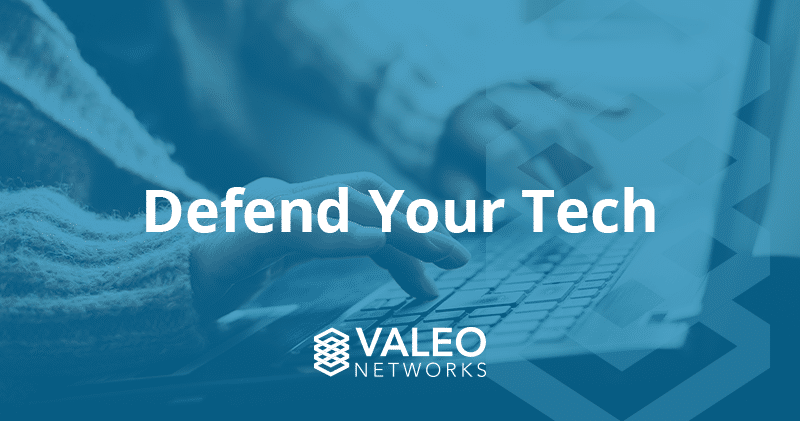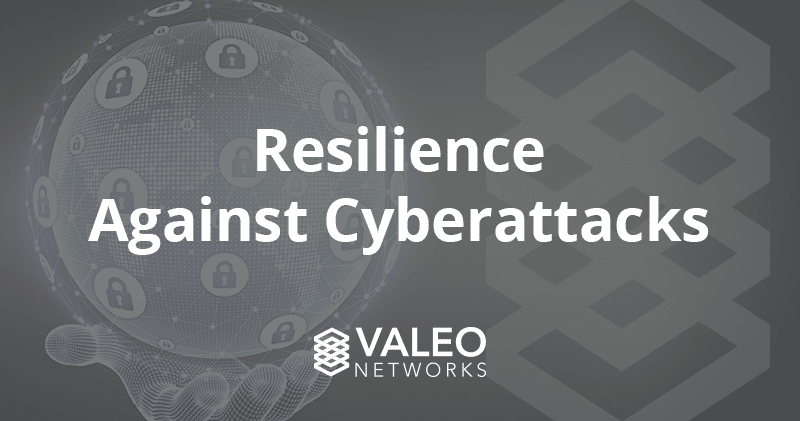AI and Cybersecurity: Protection for the Future
Technology has led the business world into an unprecedented era of production and connectivity. With the great rewards reaped from the internet era...
3 min read
Valeo Networks : Jan 22, 2019 12:00:00 AM
Pop quiz: What percentage of small businesses in the U.S. suffered a cyberattack in 2017? Without peeking below at the answer, take a guess.
Would you estimate 10 percent? Maybe 25 percent? Higher?
Answer: 47 percent of small businesses had their networks breached at least once by cybercriminals in 2017. (Worse: Almost half those businesses were then hit again.) That’s according to a survey reported in a 2018 USA Today story. After analyzing the alarming data from its survey, the research team concluded that only about three in 10 small businesses would be able to handle a cyberattack if they were hit with one today.
Why most SMBs Aren’t Prepared for a Cyber Attack
Most small companies have limited budgets and lack the IT resources they assume it would take to develop a sophisticated cyber-defense infrastructure.
Also, many SMBs mistakenly believe that their businesses are so small, so insignificant when compared to the giant, multibillion-dollar corporations whose names we all know, that hackers wouldn’t even bother trying to breach their tiny company’s network. However, as you can see from that 47 percent stat, cybercriminals are very interested in hacking small businesses.
The bad news is that hackers know SMBs don’t prioritize cybersecurity, and this is precisely why they target these companies. If you’re a burglar, it makes sense to target the house with the weakest lock.
The good news is that SMBs can significantly harden their cyber defenses without spending the millions of dollars that the mega-corporations budget each year for their cybersecurity. In fact, there are a few steps your company can and should take immediately that won’t break the bank.
1. Train Your Staff on Basic Cybersecurity Awareness
Believe it or not, one of the most successful strategies cyber criminals are still using to access businesses’ networks and data is phishing and similar social-engineering tactics.
In other words, a hacker can breach a business’s systems simply by sending a phony email to an employee (or using a pretext to engage that employee on social media). The hacker then manipulates that individual into some action—opening an attached file, clicking on a link, etc.—which the hacker has set up as a digital lock-picking device to enter the company’s systems and access proprietary data.
Train your employees on the basics of cybersecurity awareness, such as examining the sender’s email address when receiving a suspicious message, and not opening attachments or clicking links from unknown senders.
2. Create a Plan for Mobile Device Security
Let’s assume you’ve secured your company’s on-premise network with firewalls to protect your office’s Internet activity and antivirus software to thwart malicious code from infecting your in-house computers. (You’ve done those things, haven’t you?) None of those measures will matter if your employees access your company’s data or networks offsite from their mobile devices, and those mobile devices themselves are not secure.
So another important step to take is to set up a plan for mobile-device security. You can establish companywide rules, for example, that employees may not use their phones to view, transmit, or download company data unless you have first installed security apps on them and/or these devices have been password-protect.
Remember, your company’s data doesn’t live solely within the walls of your office, and your cybersecurity strategy needs to account for that reality.
3. Conduct a Cybersecurity Threat Assessment with a Third-Party Expert
Once you and your team begin researching small-business cybersecurity strategies, tools, and best practices, it’s easy to become overwhelmed. You will almost certainly discover areas in which your company’s systems and data are vulnerable to hackers right now, and your internal research will probably also reveal that your sensitive data resides in so many places that there’s no way even to keep track of it cost-effectively.
Don’t panic, and don’t throw your hands up in frustration. Given how critical your data is to your company’s operations, your business can’t afford for you to do either. Instead, bring in a team of experts—such as a Managed Security Service Provider (MSSP)—and let them perform a full cybersecurity risk assessment to identify your weaknesses and help you harden them.
Cybersecurity: It’s No Longer Optional
Bottom line: The cyber bad guys know your small business is almost certainly underprepared (if not flat-out unprepared) to stop their attacks, and it’s only a matter of time before they target your company. You won’t need millions of dollars to establish a strong cyber-defense infrastructure, but you will need to establish one. And you need to start now.
If you are interested in taking first steps toward securing your business, Valeo Networks will set you on right path with a free network scan. Contact us today to schedule your complimentary assessment.
As printed in Security Today


Technology has led the business world into an unprecedented era of production and connectivity. With the great rewards reaped from the internet era...

Risk management has been a concept ingrained in all businesses since the inception of commerce itself. Cybersecurity risk management is a whole...

Today, a growing number of smart enterprises are going on the offensive when countering advanced cybersecurity threats. Many small to medium-sized...

With cutting-edge technology and quality customer service,
you’ll find everything you need to help your company soar
with Valeo Networks.
1006 Pathfinder Way
Rockledge, FL 32955
Business Hours:
M-F: 8AM-9PM
© 2026 Copyright Valeo Networks. All Rights Reserved.